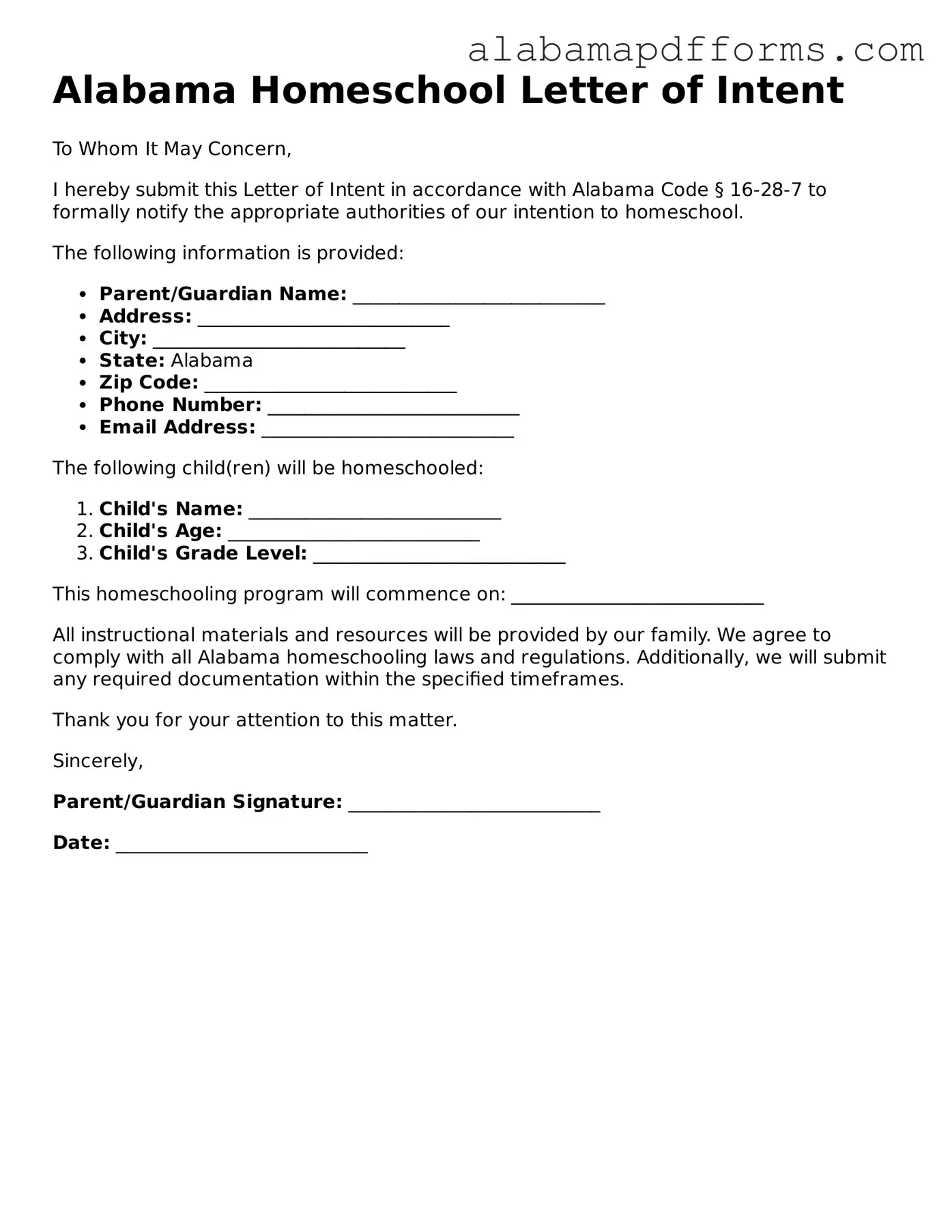The Alabama Homeschool Letter of Intent form bears similarities to the Notice of Intent form used in various states for families wishing to homeschool their children. Like the Alabama form, this document serves as a formal notification to the local school district of a family's intention to educate their child at home. It typically requires basic information about the student, the educational approach the family plans to use, and sometimes the curriculum that will be followed. This ensures that the school district is aware of the educational setting and can provide any necessary support or resources.
Another document that resembles the Alabama Homeschool Letter of Intent is the Educational Plan form, often required by states with more structured homeschooling regulations. This document outlines the educational objectives, subjects to be covered, and methods of instruction. It is similar in that it serves as a roadmap for the family's educational journey, offering transparency to the school district about how the child’s education will be managed. Both documents aim to establish a clear understanding between the homeschooling family and the educational authorities.
Understanding the various forms involved in homeschooling is essential for parents who wish to navigate this educational path successfully. Among these, the ADP Pay Stub form plays a significant role in offering clarity on finances, just as the Formaid Org provides resources to help families better manage their educational expenses. Such documents ensure that parents are fully informed about their financial responsibilities while crafting a homeschooling experience that meets their child's needs.
The Individualized Education Program (IEP) is another document that shares some common ground with the Alabama Homeschool Letter of Intent. While an IEP is specifically designed for students with disabilities, it also requires detailed information about the educational approach and goals tailored to the individual child. Like the Letter of Intent, it is a formal document that aims to ensure that the child's educational needs are met, fostering communication between parents and educational professionals.
The Affidavit of Homeschooling is a document used in some states to affirm a family's commitment to homeschooling. This document is similar to the Alabama form in that it serves as a declaration of intent. Families typically sign this affidavit to confirm they are taking responsibility for their child's education, providing a legal acknowledgment of their choice to homeschool. Both documents are important for establishing the legitimacy of the homeschooling arrangement.
The Enrollment Form for Private School is another document that has parallels with the Alabama Homeschool Letter of Intent. When families choose to enroll their children in a private school, they must complete an enrollment form that outlines similar information regarding the student and the educational environment. This form, like the Letter of Intent, serves to inform the educational institution of the family's choice and intentions, ensuring that the school has the necessary details to support the student’s educational journey.
The Certificate of Attendance is often required for students who are homeschooled in some states. This document can be similar to the Alabama Homeschool Letter of Intent in that it serves as proof of the student's educational status. Families may need to submit this certificate to local authorities to verify that their child is receiving an education at home, paralleling the intent to educate outlined in the Letter of Intent.
The Curriculum Approval Form is another document that shares characteristics with the Alabama Homeschool Letter of Intent. In states where curriculum approval is necessary, families must submit a form detailing the educational materials and subjects they plan to use. This form, like the Letter of Intent, ensures that the educational approach is documented and approved by the local education authority, fostering compliance and accountability in the homeschooling process.
Finally, the Home School Registration Form is another document that resembles the Alabama Homeschool Letter of Intent. This form is required in some jurisdictions and serves to officially register a family as a homeschooling entity. Similar to the Letter of Intent, it collects information about the student and the educational plan, ensuring that local authorities are informed of the family's choice to educate their child at home. Both documents are foundational in establishing the family's commitment to homeschooling and maintaining communication with educational authorities.

